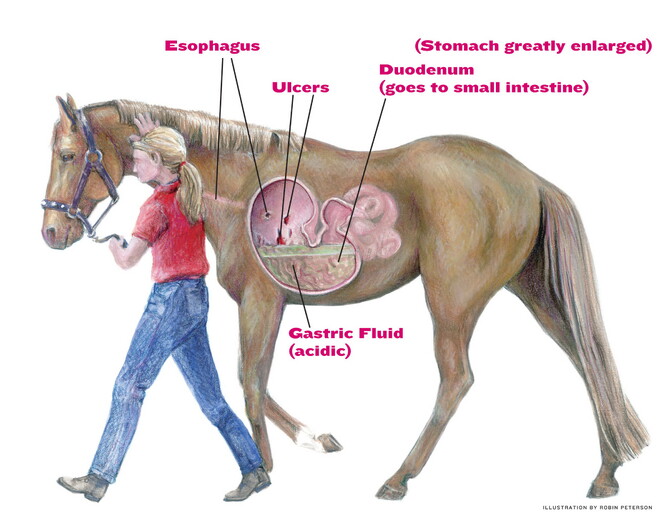Uncommonly, people don’t realize that body pain and ulcers go together.
For performance horses, equine hindgut ulcers are a serious issue that are frequently misdiagnosed as back pain.
For active performance horses, it is frequently more noticeable on the right bend (and canter lead). This is due to the fact that the horse’s right side hosts the majority of the hind gut.
The horse’s skeletal system suffers as it starts to walk crookedly due to ulcers or any other particular pain.
Additionally, the region starts to deteriorate as a result of the muscles, ligaments, tendons, and bone being affected. The horse eventually loses the ability to fully extend his joints and limbs.
The horse will occasionally become disjointed in canter, find it difficult to pick up leads, and frequently be observed not to come through the hindquarters (especially the right hind leg) due to the consistent pain patterns found in ulcer cases.
While some veterinarians use ultrasound technology, the majority base their presumptive diagnoses on data provided by the owner, rider, or trainer.
Sucralfate is the current advised course of treatment for equine ulcers. Sucralfate binds to the ulcer lesion site through a mechanical action. This provides a protective coating and promotes healing. Pain relief is noted within 3-4 days.

Is it possible that ulcers cause horse back pain?
Performance horses, especially dressage horses, are prone to back pain.
Ulcers are frequently not thought to be the cause of back pain.
Symptoms of horse back pain
- Behavioral changes
- Discomfort from front to back
- Pressure on back
- Grooming – kick and paws
- Girthy
- Wont turn right
Cause of horse back pain
Horse back pain is frequently brought on by sore back muscles and rib subluxations.
Here are some more common causes of horse back pain:
- Underlying lameness
- Poorly fitted saddle
- Bridles and bits not fitted properly
- Sore feet
- Poorly conditioned horse
- Ulcers
Horse refusing to turn right
For competition horses, especially dressage horses, right dorsal colitis, also known as equine hindgut ulcers, is a serious issue. The dressage horse should move effortlessly on each side and be as flexible as a ballet dancer. Nothing should look difficult or labored in this discipline. Moving your horse in any direction can be excruciatingly painful if they have hindgut ulcers. The back pain from the ulcer feels like it is burning and gnawing.
Due to the majority of their hindgut being on their right side, dressage horses may experience issues with their right bend. It should come as no surprise that ulcers there can prevent the horse from bending right or working off the right rein.
What happens if left untreated?
A horse’s spinal health is in danger if it consistently carries itself crooked due to ulcers or any other particular pain.
He is exerting undue pressure on other parts of his anatomy that aren’t meant to withstand that kind of pressure by attempting to avoid using the painful area. A horse with an ulcer may refuse to bend to the right, causing severe pain in the back, loin, sacro-illiac (SI), and even the neck.
This can harm bones, tendons, ligaments, muscles, and more, and it only gets worse with continued use and effort. The horse eventually loses the ability to move his joints and limbs fully, which causes abnormal stresses to develop in those areas as well.
Right canter lead avoidance, disjointed canters (particularly in the hindlegs), and resistance to cantering at all eventually become the horse’s norm. This ongoing crookedness may eventually lead to kissing spine, which is a narrowing of the space between the tops of the spines. These will rub against each other, causing skeletal changes and deliberate pain.
How to treat equine hindgut ulcers
Absucralfate is efficient in treating back pain brought on by ulcers. For 6 to 8 hours, sucralfate effectively lessens ulcer pain. It creates a layer over ulcers to shield them from further damage and hastens their healing. For the best results, horse owners should give their animals this ulcer medication at least twice daily and ideally three times daily. The ulcer could completely heal in 4 to 8 weeks. Your patience with your horse will pay off for the both of you.
FAQ
Can ulcers make a horses back sore?
Fact: Gastric ulceration is increasingly discovered in horses with back pain. Gastric ulcers are frequently discovered in horses who have a history of pain when having their girths tightened.
What are the symptoms of hind gut ulcers in horses?
Horses with hindgut ulcers may perform worse, lose weight, eat less, have diarrhea, experience recurrent colic, or develop a rough coat. Stress, hind gut acidosis, NSAID use, parasites, and other disruptions to the gut microbiome can all result in gastrointestinal ulcers.
What are the symptoms of ulcers in horses?
- Sour disposition.
- Still eating but losing condition or weight.
- Avoiding hard feed and preferring hay.
- Poor appetite.
- Unsettled in training or unwilling to work.
- Grinding teeth.
- Crib-biting, wind-sucking.
- Bad coat.
Can ulcers cause hind end lameness in horses?
Gastric ulcers are the cause of this. The horse frequently has soreness on the right hind, steps awkwardly or has a left-to-right gait, and the hind gut is on the right side of the horse.
Dr. Anderson Ulcers in horses
Reference:
https://abler.com/blog/horse-ulcers/could-ulcers-be-the-cause-of-my-horses-back-pain/
https://abler.com/blog/could-hindgut-ulcers-be-the-cause-of-my-horses-back-pain